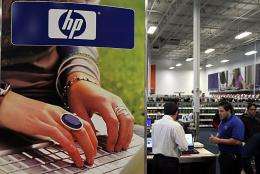US computer colossus Hewlett-Packard reported Tuesday that its net profit climbed to $2.6 billion in the first three months of the year as businesses upgraded systems.
US computer colossus Hewlett-Packard saw its stock price tumble on Tuesday on a trimmed earnings forecast that triggered fears the economic downturn will continue to weigh on the firm.
HP said its net profit climbed to $2.6 billion in the first three months of the year as businesses upgraded systems, but that computer sales to consumers lagged.
Contracts for services, such as hosting and maintaining business computer networks online in the Internet "cloud" also yielded less revenue than the company had hoped, though HP predicted its commitment to the sector would pay off handsomely.
Its net revenue climbed to $32.3 billion in the first quarter, compared to $31.2 billion in the same period a year earlier.
Revenue was up four percent in a year-over-year comparison, while net profit rose 16 percent with the help of "financial discipline" at the California-based computer company, according to chief financial officer Cathie Lesjak.
"Going forward, we have the opportunity to further capitalize on our customers' demands for higher value-added solutions," said HP chief executive Leo Apotheker.
"HP has a powerful portfolio, including exciting, recently announced cloud and connectivity offerings," he continued in a statement released with the earnings figures. "We are focused on leveraging these strengths to extend our leadership and accelerate growth."
The earnings figures fell short of Wall Street forecasts and HP stock prices dove nearly 12 percent to $42.45 per share in trading that followed release of the results.
HP estimated that its revenue in the current quarter would range from $31.4 billion to $31.6 billion and that net earnings per share would be from 99 cents to $1.01.
"I think HP is being appropriately cautious," Forrester Research analyst Frank Gillett said of the firm reducing its earnings forecast for the quarter.
"It's completely natural when a new CEO comes in and hasn't laid out a strategy," he continued. "A new CEO is going to be cautious until he gets his footing."
Apotheker took over the HP helm late last year to replace Mark Hurd, who resigned as HP chief in early August after a sexual harassment probe uncovered subterfuge with company expenses.
He previously worked as CEO of Germany's SAP, which he left a year ago after a short tenure.
Apotheker said in an earnings conference call that he would reveal his strategy for the world's largest computer maker at an "HP Summit" in San Francisco on March 14.
HP predicted that its fortunes would improve in the second half of the year as revenues begin kicking in from cloud services and a TouchPad tablet computer and two smartphones powered by Palm's webOS software.
"It is clear we do a lot of things well," Apotheker said. "But, it is also clear we have isolated areas where we need to improve."
Lesjak said HP was overcoming "challenges in China" where last year the firm extended warranty protections after being hit with complaints of some laptops overheating.
"We are not yet where we want to be, but we are cautiously optimistic," Apotheker said of HP in China. "It is an important market and we are very determined to get it right."
HP remained "prudent and cautious" regarding the consumer market for personal computers.
Gillett did not expect the growing popularity of tablets to hurt desktop computer sales.
"Our research shows the tablet is a companion device rather than a replacement device," Gillett said.
"You might see people turn in fancy laptops for a desktop computer and a fancy table," he explained. "We don't think the iPad and TouchPad will cause a decrease in purchases of PCs."
The key for HP will to be to nimbly shift production capacity between its products to stay in tune with the mix, according to the analyst.
(c) 2011 AFP






















